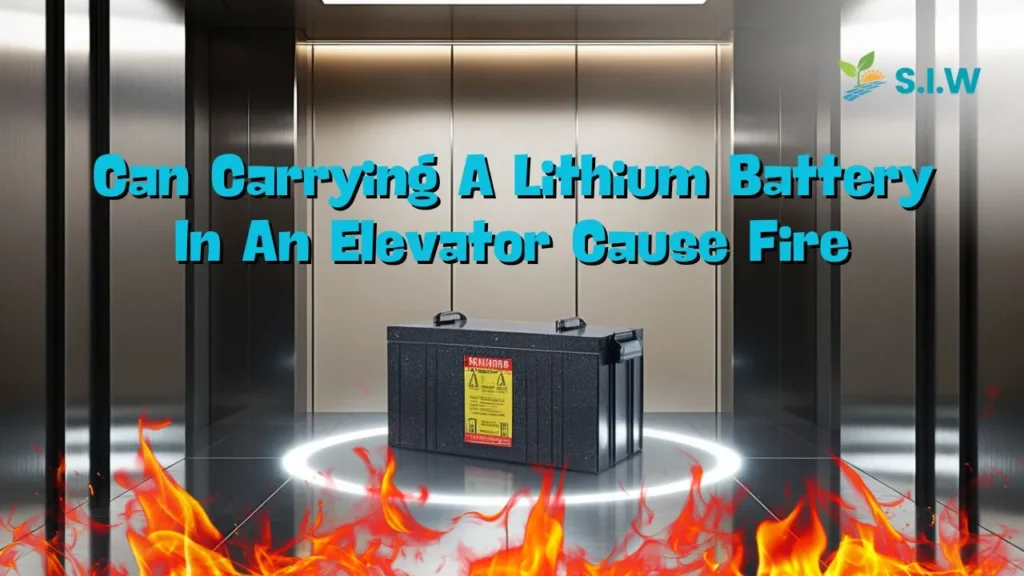Lithium batteries have become ubiquitous in modern devices, powering everything from smartphones to electric vehicles. However, their presence in confined spaces, such as elevators, raises concerns about potential hazards. This article explores the risks associated with carrying lithium batteries in elevators and provides insight into the factors that can lead to fires.
Understanding the Risk: Lithium Batteries and Fire Hazards
Lithium-ion batteries, while efficient, are known for their volatility under certain conditions. A fire hazard may arise if the battery is compromised in any way, whether through damage, overheating, or internal short circuits. The confined nature of an elevator may exacerbate these risks by limiting ventilation and preventing rapid escape, increasing the severity of an incident.
How Lithium Batteries Fail
Lithium batteries typically fail due to the following reasons:
- Thermal Runaway: This occurs when a battery becomes too hot, causing internal reactions that further increase the temperature. If left unchecked, thermal runaway can cause the battery to catch fire or even explode.
- Physical Damage: Batteries that are dropped, punctured, or crushed can develop internal short circuits. In such cases, the energy stored in the battery is released rapidly, leading to overheating.
- Manufacturing Defects: Poor-quality batteries or those with hidden manufacturing defects can fail unexpectedly, potentially catching fire without external causes.
Specific Risks in Elevators
The dangers of carrying lithium batteries in elevators are amplified by several factors:
- Limited Ventilation: Elevators have restricted airflow, which can lead to the rapid accumulation of smoke and heat should a fire start. This poses a greater risk for passengers and the elevator’s electrical systems.
- Small, Confined Space: In a confined space like an elevator, any fire or explosion will affect all occupants. There’s no escape route, and people are forced to remain in close proximity to a dangerous situation.
- Potential for Jostling and Damage: Elevators often experience jerks, especially during sudden stops. This movement can potentially damage lithium batteries being carried, particularly if they’re not in protective cases.
Preventing Fires When Carrying Lithium Batteries
While the risks are real, steps can be taken to minimize the chances of a fire when carrying lithium batteries in an elevator.
Use Certified Batteries
Always opt for batteries that are certified by reputable regulatory bodies like UL (Underwriters Laboratories). These certifications ensure that the batteries have undergone rigorous testing for safety and performance.
Proper Handling and Storage
- Protective Casings: Ensure that batteries are stored in protective casings to minimize the risk of damage from physical shocks or exposure to external elements.
- Avoid Extreme Temperatures: Batteries should be kept away from heat sources. If a battery feels warm, avoid using it until it has cooled down. Extreme temperatures can trigger thermal runaway.
- Charge Safely: Never carry a battery that is actively charging in an elevator. Charging generates heat, and the confined space of an elevator may prevent proper dissipation of that heat.
Maintenance and Inspection
Regularly inspect batteries for any signs of swelling, leaking, or physical damage. If you notice any of these issues, the battery should be properly disposed of according to local regulations.
What to Do If a Lithium Battery Catches Fire in an Elevator
In the event of a fire in an elevator caused by a lithium battery, it is crucial to take immediate action to protect yourself and others. Here are the recommended steps:
Evacuate the Elevator
If the elevator is between floors and the doors are closed, press the emergency stop button and communicate with the building’s security or maintenance team through the elevator’s intercom system. Stay calm and wait for assistance.
Use Fire-Resistant Materials to Contain the Battery
If possible, use fire-resistant gloves or any available material (e.g., clothing or bags) to contain the battery. However, be cautious, as lithium battery fires can reignite and emit toxic fumes.
Avoid Using Water
Do not attempt to extinguish a lithium battery fire with water. Lithium-ion batteries are sensitive to water and can react violently. Instead, use a Class D fire extinguisher or any available fire suppression system in the elevator.
Safety Precautions Are Essential
Carrying a lithium battery in an elevator does not automatically mean a fire will occur, but the risk is heightened in confined spaces. By understanding the specific hazards associated with lithium batteries, such as thermal runaway and physical damage, and by following safety protocols, these risks can be minimized. Always handle lithium batteries with care, especially in spaces like elevators where escape may not be immediate.








